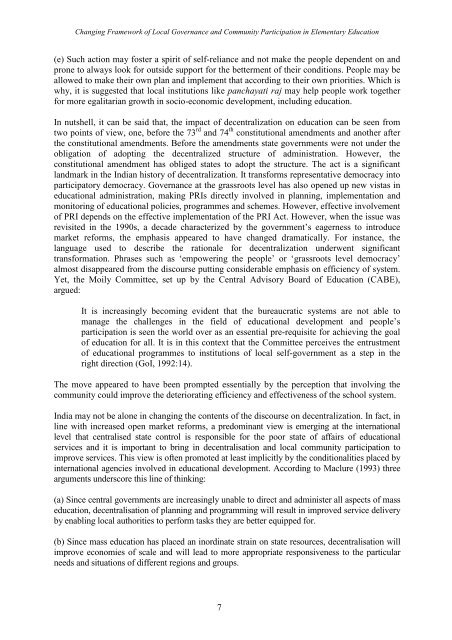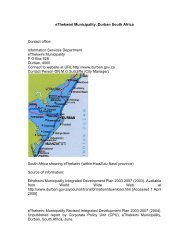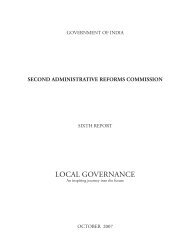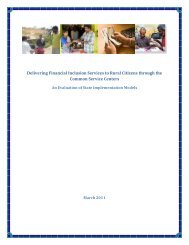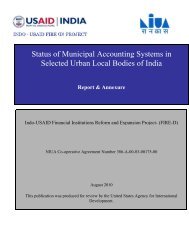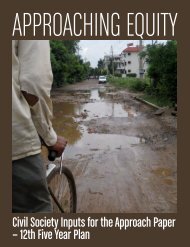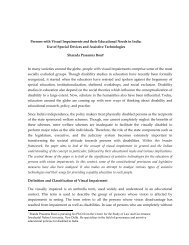Changing Framework of Local Governance and - Create
Changing Framework of Local Governance and - Create
Changing Framework of Local Governance and - Create
You also want an ePaper? Increase the reach of your titles
YUMPU automatically turns print PDFs into web optimized ePapers that Google loves.
<strong>Changing</strong> <strong>Framework</strong> <strong>of</strong> <strong>Local</strong> <strong>Governance</strong> <strong>and</strong> Community Participation in Elementary Education(e) Such action may foster a spirit <strong>of</strong> self-reliance <strong>and</strong> not make the people dependent on <strong>and</strong>prone to always look for outside support for the betterment <strong>of</strong> their conditions. People may beallowed to make their own plan <strong>and</strong> implement that according to their own priorities. Which iswhy, it is suggested that local institutions like panchayati raj may help people work togetherfor more egalitarian growth in socio-economic development, including education.In nutshell, it can be said that, the impact <strong>of</strong> decentralization on education can be seen fromtwo points <strong>of</strong> view, one, before the 73 rd <strong>and</strong> 74 th constitutional amendments <strong>and</strong> another afterthe constitutional amendments. Before the amendments state governments were not under theobligation <strong>of</strong> adopting the decentralized structure <strong>of</strong> administration. However, theconstitutional amendment has obliged states to adopt the structure. The act is a significantl<strong>and</strong>mark in the Indian history <strong>of</strong> decentralization. It transforms representative democracy intoparticipatory democracy. <strong>Governance</strong> at the grassroots level has also opened up new vistas ineducational administration, making PRIs directly involved in planning, implementation <strong>and</strong>monitoring <strong>of</strong> educational policies, programmes <strong>and</strong> schemes. However, effective involvement<strong>of</strong> PRI depends on the effective implementation <strong>of</strong> the PRI Act. However, when the issue wasrevisited in the 1990s, a decade characterized by the government’s eagerness to introducemarket reforms, the emphasis appeared to have changed dramatically. For instance, thelanguage used to describe the rationale for decentralization underwent significanttransformation. Phrases such as ‘empowering the people’ or ‘grassroots level democracy’almost disappeared from the discourse putting considerable emphasis on efficiency <strong>of</strong> system.Yet, the Moily Committee, set up by the Central Advisory Board <strong>of</strong> Education (CABE),argued:It is increasingly becoming evident that the bureaucratic systems are not able tomanage the challenges in the field <strong>of</strong> educational development <strong>and</strong> people’sparticipation is seen the world over as an essential pre-requisite for achieving the goal<strong>of</strong> education for all. It is in this context that the Committee perceives the entrustment<strong>of</strong> educational programmes to institutions <strong>of</strong> local self-government as a step in theright direction (GoI, 1992:14).The move appeared to have been prompted essentially by the perception that involving thecommunity could improve the deteriorating efficiency <strong>and</strong> effectiveness <strong>of</strong> the school system.India may not be alone in changing the contents <strong>of</strong> the discourse on decentralization. In fact, inline with increased open market reforms, a predominant view is emerging at the internationallevel that centralised state control is responsible for the poor state <strong>of</strong> affairs <strong>of</strong> educationalservices <strong>and</strong> it is important to bring in decentralisation <strong>and</strong> local community participation toimprove services. This view is <strong>of</strong>ten promoted at least implicitly by the conditionalities placed byinternational agencies involved in educational development. According to Maclure (1993) threearguments underscore this line <strong>of</strong> thinking:(a) Since central governments are increasingly unable to direct <strong>and</strong> administer all aspects <strong>of</strong> masseducation, decentralisation <strong>of</strong> planning <strong>and</strong> programming will result in improved service deliveryby enabling local authorities to perform tasks they are better equipped for.(b) Since mass education has placed an inordinate strain on state resources, decentralisation willimprove economies <strong>of</strong> scale <strong>and</strong> will lead to more appropriate responsiveness to the particularneeds <strong>and</strong> situations <strong>of</strong> different regions <strong>and</strong> groups.7


